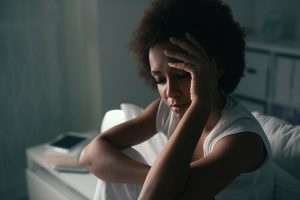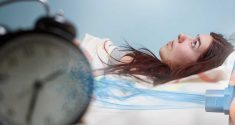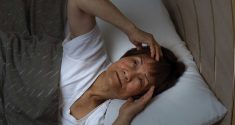According to the National Sleep Foundation, the definition of insomnia is “difficulty falling asleep or staying asleep, even when a person has the chance to do so.” Insomnia may present as either acute or chronic. The chronic form of insomnia is estimated to be experienced by about 1 in 10 Americans, and the sleep disorder can severely degrade the quality of life in those who suffer from it. Women may be somewhat more likely to suffer from insomnia than men. Generally, older people experience more insomnia than younger people.
Those who have experienced insomnia can confirm that it easily becomes a vicious cycle—difficulty sleeping can lead to anxiety and stress over lost sleep, and this stress keeps the patient awake even longer. The conventional assumption throughout the decades has been that insomnia is primarily psychological, being initiated by and perpetuated by worry and stressful thoughts. However, it is now known that this view of insomnia is one-dimensional and not representative of the whole truth. Now, new research sheds light on the genetic origins of insomnia.
Research Identifies Genes for Insomnia
The research in question was conducted by a team led by Dutch professors Danielle Posthuma and Eus Van Someren and was published in the journal Nature Genetics. For the research, the team members used what is called a genome-wide association study, a method of quickly scanning human DNA for genetic markers for specific diseases. The researchers also implemented another process called a genome-wide gene-based association study, which is a method of focusing more closely on individual genes to examine correlations between gene variations.
These genetic analysis methods were used on the DNA of over 113,000 participants, most of whom were over the age of 50. The researchers discovered seven different genes that can each influence a person’s genetic risk for insomnia. Previous research has found that many of these same insomnia genes are also associated with other conditions including anxiety, depression and restless legs syndrome. This implies that those who suffer from insomnia are more likely to also suffer from these other disorders and vice versa.
However, restless legs syndrome, in particular, was the disorder with the most genetic overlap with insomnia. With this condition, patients experience an irresistible urge to move their legs. The compulsive fidgeting worsens in severity at night, interfering with falling asleep and easily contributing to the development of insomnia. Up to 1 in 10 Americans experience restless legs syndrome.
Genetic factors are thought to apply primarily to chronic insomnia. Short-term, acute insomnia may not have much of a genetic basis, instead, it is caused by environmental factors like stress, travel, substance use and illness.
Does Having Insomnia Genes Guarantee Insomnia?

In turn, the sleep deprivation caused by insomnia can affect the expression of over various genes. In fact, research has found that even one week of mild sleep deprivation affects the expression of 711 distinct genes. Sleeping during the daytime rather than at night, a practice that greatly reduces sleep quality, can disrupt the natural function of up to one-third of all of a patient’s genes.
The effects of sleep disturbances on genetics can be explained by the circadian rhythm. The circadian rhythm is the 24-hour cycle that, at its most basic level, is responsible for the rhythm of wakefulness and sleep. However, also entwined with the circadian rhythm are countless bodily functions such as immune response, metabolism, inflammation, digestion, and of course, gene expression. Sleep deprivation and sleeping during the day both confuse the circadian rhythm, and all of the anatomical processes influenced by the circadian rhythm suffer as a result.
Ways to Get Better Sleep
Sleep hygiene refers to a collection of practices that foster quality sleep and falling asleep quickly. Those who suffer from insomnia should take measures such as:
- going to bed and waking up at the same time every single day
- not eating large meals within a few hours of bedtime
- limiting caffeine consumption, and not consuming any caffeine less than 6 hours before bedtime
- turning down the lights and turning off electronic screens one hour before bedtime in order to promote melatonin secretion
- using the bedroom only for sleeping and sex, in order to create a psychological association that fosters good sleep
- avoiding alcohol and nicotine, especially within a couple hours of bedtime
If insomnia symptoms persist despite sleep hygiene precautions, a next step is to try natural supplements that promote sleep. These supplements are ideally taken one to two hours before bedtime. Good examples of oral supplements to relieve insomnia include melatonin, passion flower, chamomile, lavender, valerian and hops. Natural supplements may provide relief without the side effects or high cost associated with many prescription medications for sleep.
However, if insomnia symptoms still persist despite sleep hygiene and sleep supplements, the patient should visit his or her medical professional. Prescription medications may be necessary in moderate-to-severe cases of insomnia.







